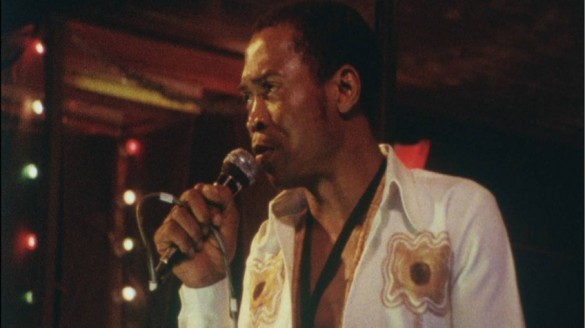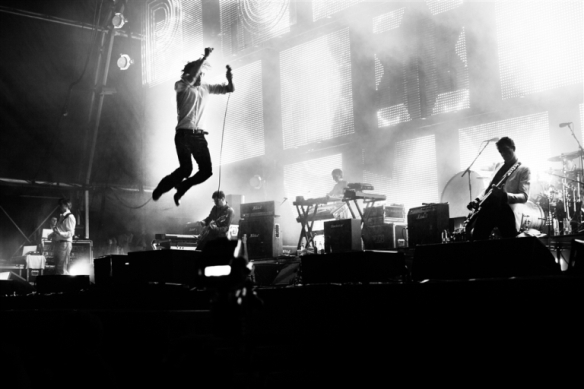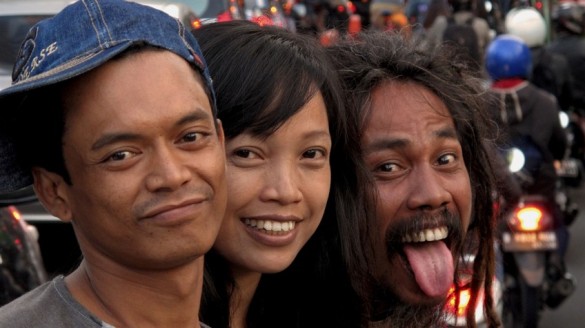Fela, the Nigerian Afrobeat musician, activist and all-round troublemaker, was the sort of fellow who would cross the road to get in a fight. Just because. At some point during his immensely productive yet at times curiously unfocused career, he changed his surname from the patrician-sounding Ransome-Kuti to the indigenous Anikulapo-Kuti. “I am the one who carries death in my pouch,” he explained helpfully, referring to the literal translation of his born-again name. Other times, he would stand in front of baying audiences, clenched fist raised aloft. “Music is the weapon”, he’d say. And we’d scream the same back.

The bigger question always was, though, what exactly was Fela fighting against? Corrupt politicians, mendacious military dictatorships, the self-satisfied stupor of the bourgeois Nigerian middle class. He wasn’t always terribly clear about his targets. He declared himself a champion of Africanism; this sounded very nice until you actually tried to pin him down on the core values of his ideology. He did try to explain them once, during a quixotic bid to run for President of Nigeria in 1978 (the electoral commission rejected his candidature); amongst other things, he proposed the closure of all schools and the relocation of the superannuated students to the nation’s farmland. But that’s another story altogether…
Alex Gibney turns out documentary films with almost metronomic efficiency (as it happens, he has another new film screening at DocAviv, about his encounters with the disgraced cyclist Lance Armstrong). He is an extremely disciplined filmmaker, which probably makes him a good person to take the lead in Finding Fela, the new documentary that tries to make sense of the man, the music and his message. The framing device is the hit Broadway musical, Fela! (as unlikely as this sounds: but if you ever have the chance of seeing it, I can’t recommend it highly enough), and the two year journey from rehearsals to a triumphant performance in Lagos, Fela’s hometown.
It’s not very hard to figure out Fela’s appeal. He was a character, charismatic and played a mean saxophone. Despite his distinguished lineage (his mother, Funmilayo Ransome-Kuti, was a well known activist and feminist; Wole Soyinka, the Nobel prize laureate and playwright, was his first cousin), he was always a rebel; above all, he constantly, incessantly, lit the torch paper of social criticism beneath successive despotic and corrupt regimes in Nigeria.
But he was a complicated and complex character, and Gibney does well to capture the contradictions that Fela embodied – the social conscience against some pretty dodgy sexual politics, the industrial dope smoking against a very keen and articulate social conscience, the insistence on the primacy of his African roots that – at the very least – hastened his death from AIDS in 1997. A succession of talking heads try – with varying degrees of success – to put the man’s legacy in context. Perhaps I’m being a tad too critical, given that I grew up around Fela and his musical legacy. It’s a great film, and worth watching even if you don’t know the first thing about Afrobeat or Nigeria.

The musical movement that was once known as Britpop reached its apotheosis about 20 years ago, but its roots go back a further few years, to the fag-end of Thatcher’s social complacency and to a genuine sense of do-it-yourself renewal in the British cultural sphere. Pulp, who had been marching along doggedly since 1983, were there from their beginning. Their 1995 single Common People, was not just their finest moment but also a self-contained primer about where Britpop came from and where it was going.
Florian Habicht’s eponymous Pulp is perhaps a bit too self-involved to give a true sense of that era in the 90s when British guitar-based music had its moment in the sun. But it is a jolly good portrait of a band at the heart of a unique cultural statement that extended to the visual arts, video games and even the occasional decent film. By the time Tony Blair co-opted the zeitgeist (and, perhaps inadvertently, destroyed it) in the late 1990s, Britpop had become a soulless metropolitan movement. But it started in the provinces: Manchester, Glasgow, Colchester, Bristol and Pulp’s Sheffield. Jarvis Cocker – Pulp’s arch and distinctly nebbish lead singer and songwriter – and company have grown old and sensible in the intervening years (Cocker, scandalously, mooned Michael Jackson during an awards ceremony in 1997 – looking back with the benefit of hindsight, it is hard to explain now why there was such a fuss at the time). But it’s still fun to hear them, and their devoted fan base, look back on the birth of Britain’s last genuinely independent cultural statement, as the band prepare for a “thank-you” concert back in Sheffield, where it all started for them almost 30 years ago.

Daniel Ziv, a Canadian filmmaker, moved to Indonesia in the late 1990s, and has since successfully embedded himself in the cultural and political sphere of the sprawling country. He uses this duality to occasional good advantage in Jalanan, an observational documentary that follows three street buskers in Jakarta across a number of years.
The baselines are poverty and corruption. Boni lives in an underground sewer with his wife, but somehow manages to put a positive spin on his circumstances. It’s a refuge not a home, he explains, but – and unlike the rest of Jakarta – they have constant running water, thanks to a leak in the municipal water supplies.
Ho, dreadlocked and goatteed, alternates between cheerfulness and cynicism. He seems to genuinely enjoy serenading commuters on Jakarta’s public transport system: “How many people am I exposed to every day?” he wonders aloud. That said, his songs have a distinct edge. “Hang the corrupters,” he sings. “Reformation? Masturbation. It’s all empty talk.”
Titi takes a different path. She sings sweet melodic songs extolling the virtues of a life given over to Allah. “The women in scarfs don’t usually give money,” she explains. “But (with a song like this), sometimes even $10.” The average tip is 10c, it’s worth pointing out.
All three have their trials and tribulations; Ziv tries to craft from their stories an authentic portrait of life on the margins. But Jalanan isn’t, I feel, the compete article. The honesty with which he captures indigent life does not, for a long while, offer any hope of redemption. Of course, one does not and should not demand stories with nicely constructed Hollywood endings. But there is a thin line between vérité and voyeurism, and I’m not sure Jalanan always manages to successfully negotiate this.
It might be a matter of length, though; at an hour and three quarters, the film sometimes seems drawn out just for the sake of it. But the last third, which concentrates mainly on Titi and her struggle to complete her high school diploma many years after being forced to drop out of school, has an unforced simplicity and honesty. At one point, she is talking about the tribulations of her life. Behind her, stencilled in English, is the motto: Resist to Exist.
She, and Ho and Boni, resist through their music. Maybe Fela was right. Music may just be the weapon.
Jalanan (2013)
Directed by Daniel Ziv
108 minutes, Indonesian w. English subtitles
Pulp (2014)
Directed by Florian Habicht
90 minutes, English
Finding Fela! (2014)
Directed by Alex Gibney
119 minutes, English, Yoruba and French w. English subtitles





